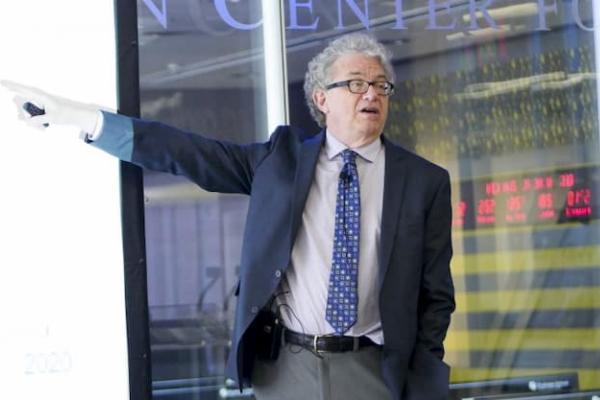OUTSTANDING FINANCE & RISK MANAGEMENT LOOKS LIKE

Breadcrumb
Credit hours: 30+ (possible prerequisite)
Full-time, part-time
Fully online option
Start terms: fall, spring, summer
GMAT/GRE optional
Investing in the future starts with YOU!
Empowering you with the expertise to deliver sound financial advice and effectively manage risk, CU Denver’s MS in Finance and Risk Management program connects you directly to industry leaders through its deep professional ties. Designed for flexibility, the program offers online classes that fit your schedule, allowing you to balance your studies with other commitments. Gain practical experience using essential tools and platforms like Bloomberg, Morningstar, and CQG, ensuring you’re prepared to excel in today’s dynamic financial environment.
specializations
to tailor your degree
held in a world-class
commodities center
Institute Affiliated University
A Master degree in Finance and Risk Management at CU Denver Business School will help you gain insight into the economics and finance behind modern business and add critical quantitative skills to your resume.
As a part of the CFA Institute’s University Affiliation Program, a majority of the curriculum reflects the practice of investment management. By graduation, you’ll be prepared to pass the Chartered Financial Analyst (CFA) exam and land upper-level finance positions.
With this hands-on degree, you’ll have the opportunity to dive deep into special topics like behavioral and political finance and international corporate governance. With five specialization options, you can also choose to tailor your degree to focus on commodities, risk management and insurance, economics, financial analysis, or general finance.
Quantitative skills are integrated throughout the curriculum. At the Commodities and Finance Lab, you’ll be able to participate in commodity market analysis, futures and derivatives of trading, and portfolio management. Computer terminals are outfitted with the following software:
-
Bloomberg
-
CQG
-
IHS Markit
-
Trading Technologies
The MS Finance and Risk Management curriculum consists of 30 hours of core courses and finance electives. There is also a three-hour prerequisite that may be waived based on prior business education.
Financial accounting prerequisite (3 hours)
This course may be waived if you have completed one undergraduate or graduate financial accounting course from an accredited institution with specific grade requirements.
Finance core courses (18 hours)
Grow your quantitative skills and theoretical knowledge in tandem with each other to better analyze financial trends and market changes. Course topics include:
- Financial management
- Corporate Risk Management
- Quantitative methods for finance
- Applied economics for managers
- Investment management analysis
- Survey of financial and commodity derivatives
Finance specialization (12 hours)
Pursue one of five specializations in general finance, financial analysis and management, commodities, risk management and insurance, and economics. Options include a number of special topics courses that reflect modern trends in the financial markets. Course topics include:
- Financial modeling
- Strategic risk management
- Behavioral and political finance
- International corporate governance
- Probabilistic modeling
- Mergers and acquisitions
You will choose one of the following specializations as a part of your degree. Each specialization requires 12 hours of coursework.

General Finance
This specialization allows students to customize their studies to finance-focused courses. It also allows flexibility to take risk or commodities courses. This is specialization can be done completely online. Course topics include:
- Econometrics
- Financial statement analysis
- Entrepreneurial financial management

Financial Analysis and Investment Management
This specialization caters to those looking at careers in corporate finance, financial analysis and management, acquisitions and corporate restructuring, private equity, or investment banking. Course topics include:
- Financial decisions and policies
- Business firm valuation
- International corporate governance

Commodities
This specialization targets those looking to advance their careers in investments and trading in assets and derivatives. You’ll be able to fully leverage the resources from the J.P. Morgan Center for Commodities and Energy Management. Course topics include:
- Foundations in commodities
- Commodity supply chain management
- Trading in commodity and financial markets
- Probabilistic modeling
*CMDT courses are assessed a different tuition rate. Please refer to the J.P. Morgan Center for Commodities and Energy Management website for more information.

Risk Management and Insurance
Risk management is a field with huge demand for talent. 50% of the industry is expected to retire in the next few years. Learn how to identify, evaluate, and mitigate risks in relation to financial decisions. This is specialization can be done completely online. Course topics include:
- Cyber Risk Management
- Strategic Risk Management
- Corporate Risk Management,
- Global Risk Management,
- Principles of Risk & Insurance

Economics
Build a strong foundation of macro and microeconomics coursework that directly relates to the finance profession. Some courses are taken through the economics department and may require additional economics prerequisites. Course topics include:
- Mathematical economics
- Microeconomic theory
- Macroeconomic theory
- Econometrics
We offer this degree entirely online.
The economics specialization requires some on-campus learning.
Take classes in a hybrid format (classroom and online) or complete your degree in a fully online curriculum. Your online courses are taught by the same professors and lecturers that teach on campus. We also offer hybrid courses in the evening for those working full-time.
Online courses are asynchronous, meaning there is no specific meeting day/time. Hybrid courses combine in-person and online learning. The in-person experience typically occurs once a week, from 6:30-9:15 p.m., one evening between Monday and Thursday. There will be at least six in-person meetings during the 8-week session, complemented by asynchronous content.
Most graduate courses are offered as an 8-week session within the 16-week fall and spring semesters. Graduate courses in the summer semester extend for the entire semester, which is an 8-week session as well.
National research shows increased graduation rates among students taking courses in an 8-week session. The data on 8-week courses shows increased student success and course completion rates. The course material is condensed into eight weeks. So, while the weekly workload is greater, you can complete the course in half the time! It is recommended to take one course per each 8-week session, particularly if you work full-time, which allows you to place your focus on just that course.
Additionally, offering courses in 8-week sessions every semester enables you to balance and manage life responsibilities while still prioritizing your education. For instance, if you have a vacation, family commitment or business trip occurring in the first 8-week session, you can choose to enroll only in a course offered in the second eight-week session.
MS Finance and Risk Management
Value 1: Think Critically
Outcome: Apply appropriate theories to available economic and financial data to arrive at value-maximizing decisions.
Value 2: Analyze Quantitative Data
Outcome: Apply quantitative models, methods, tools and/or frameworks, combined with theoretical knowledge, to a set of applied financial problems.
Value 3: Take a Global Perspective
Outcome: Evaluate the impact of global financial and economic contexts on business strategy and operations.
Value 4: Behave Ethically
Outcome: Apply appropriate theories to incorporate ethics into investment analysis and the financial decision-making process.
These objectives are assessed in relevant courses across the curriculum using exam questions.
Finance Careers
Finance jobs are found in nearly all corporate, public sector and non-profit organizations. Key areas include corporate or public finance, banking, and investment services.
Finance Job Titles
- Budget Analyst
- Compliance Analyst
- Credit Analyst
- Financial Analyst
- Investment/Portfolio Analyst
- Insurance Agent
- Operations Analyst
- Loan Office/Banker
- Broker
- Trader
- Financial Advisor/Consultant
- Fixed Income Associate
- Equity Research Associate
- Retirement Associate
- Underwriter
- Asset Analyst
- Wealth Advisor
Visit our Careers page for more detailed information on the resources available.
Tuition
The cost of tuition for the MS Finance and Risk Management degree is different for in-state and out-of-state students.
Residents of western states may qualify for in-state tuition. The Western Regional Graduate Program (WRGP) requires that students maintain current residency of WRGP state until degree completion.
Scholarships
Scholarships are available for students. As a current student, you can apply for scholarships every semester. Some awards are based on program and course enrollment.
Newly Admitted and Continuing Students:
You can apply for additional scholarships every semester of enrollment. Some awards may be specific to individual programs or enrollment in specific courses. Certain certificates, including risk management and insurance, commodities, and entrepreneurship, have additional scholarship opportunities.
Dual degree options for Master of Science programs include all of our MBA programs and all Business School Master of Science programs. We design a specific degree plan so you get through both programs as quickly and cost-effectively as possible. The amount of credits in each dual degree depends on the amount of overlap between degree programs. Eligible Master of Science programs include:
- MS Accounting
- MS Business Analytics
- MS Finance and Risk Management
- MS FinTech
- MS Information Systems
- MS International Business
- MS Management
- MS Marketing
- MS Sustainable Business
If you are applying for both degrees, you will only need to submit one online application and pay one application fee. Be aware that you must meet specific admission standards for each degree. For more information about dual degree options and the application process, please contact BSchool.Admissions@ucdenver.edu.
Partner Dual Degree Programs
We have also partnered with other CU Denver departments to offer dual degree options for the following programs. You will need to apply to both programs separately and follow the admission requirements for each program.
- MA Economics from the CU Denver College of Liberal Arts and Sciences
- Graduate School of Banking at Colorado
Application Checklist
$50 domestic, $75 international application fee
Online application
Official transcripts from each college or university attended
Essay responses
Resume
GMAT/GRE optional
English language proficiency—international applicants only
Application Process
Applicants are required to submit all application materials. Interviews are not a part of the admission process. To receive priority admission, we must have received your online application and all other required materials including transcripts and GMAT/GRE scores by the deadline.
You can check your admission status online through the account you created for the online application. You will receive a final decision by email within two to three weeks from the submission of all materials.
Admission Requirements
- Applicants must have completed an undergraduate program at an accredited United States college or its equivalent in another country.
- No work experience or formal business education is required for admission, however, you may have to provide a GMAT or GRE score if you do not have enough work experience, see below.
The GMAT/GRE is not required for this program
The MS in Finance and Risk Management program does not require GMAT or GRE scores for their degree program as part of the graduate admissions requirements. The requirements are a cumulative GPA of 3.25 or better from a US accredited four-year undergraduate institution and three or more years of full-time professional work experience or the successful completion of a graduate degree.
However, if you received your bachelor’s degree with a grade point average of less than 3.25 or have less than 5 years of professional work experience, you will be asked to submit a statement that outlines other indicators of exceptional motivation, such as solid upper-division performance, GMAT or GRE scores, and other relevant professional experience. The MS Finance and Risk Management admissions committee may require a minimum GMAT or GRE score for students that do not automatically qualify by GPA and prior work.
How Decisions Are Made
The admissions committee considers each candidate’s entire record of achievement. This is demonstrated through:
- Academic transcripts
- Essay responses
- Work experience
- Extracurricular and community activities
- Letters of recommendation if applicable
- GMAT/GRE scores if applicable
No work experience or formal business education is required for admission. However, professional experience strengthens your application. Candidates with less work experience can show potential through academic and experiential success.
For any questions, please contact our admissions team at bschool.admissions@ucdenver.edu or call 303-315-8200.
International Applicants
International applicants must also demonstrate proficiency in written and oral English.
To determine English Language Proficiency (ELP), you must complete one of the following:
- English language proficiency test
- Citizenship exemption
- Coursework completion
- CU Denver ESL Academy (Level 5) graduation
- Exception for certain visa types
Please note for Business School graduate programs TOEFL minimum scores are as follows:
|
Programs: |
TOEFL iBT (0 - 120) |
*TOEFL iBT (0 - 6) |
|
MS programs |
72+ |
4 |
|
Denver Flex & Online MBA |
86+ |
4.5 |
|
One Year MBA |
95+ |
5 |
*Scores in the 1 - 6 scale applies only to TOEFL iBT tests taken on or after January 21, 2026.
For more details about the English Language Proficiency requirement, please visit the following page.
International graduate applicants will have their academic credentials evaluated by CU Denver’s Office of International Affairs
Plan to submit materials early to expedite processing. Deadlines apply to all required documents.
Fall
Domestic Application Deadlines
- Priority: April 15
- Final: July 15
International Application Deadlines
- Priority: March 15
- Final: May 15
Spring
Domestic Application Deadlines
- Priority: October 15
- Final: December 15
International Application Deadlines
- Priority: September 15
- Final: October 15
Summer
Domestic Application Deadlines
- Priority: February 15
- Final: April 15
International Application Deadlines
- Priority: January 15
- Final: March 15
Our ties to industry partners include companies such as:
- Ardent Mills
- CME Group
- CQG, Inc.
- Ovintiv, Inc.
- J.P. Morgan
- Newmont Mining
- Robert Bosch GmbH
“I had a fantastic experience in the CU Denver MS in Finance and Risk Management program. It provided me with a strong foundation in corporate finance and financial markets. The flexible online format allowed me to begin my career while finishing my degree, making the program a great fit for my professional goals.”
– Benjamin Pharris ’24
Request More Information
Upcoming events
Attend a graduate open house, online or in-person information session, or a GMAT test prep workshop. Visit our events page for all upcoming events.
- Business School: Graduate Programs Information Session on 2/18/2026
- Business School: Executive MBA Information Session 2/18/2026
- Business School: Graduate Programs Information Session on 2/25/2026 (webinar)
- Business School: Graduate Programs Information Session on 3/4/2026 (webinar)
- Business School: Graduate Programs Open House on 3/18/2026



